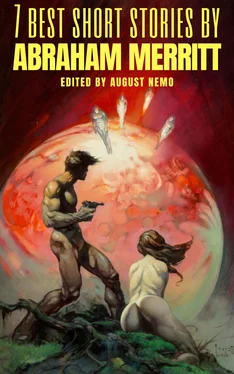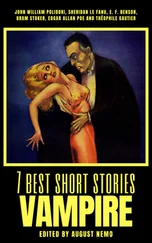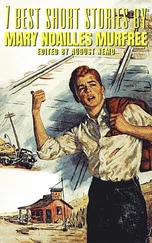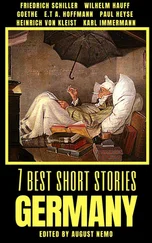Born in Beverly, New Jersey, he moved to Philadelphia, Pennsylvania in 1894. Originally trained in law, he turned to journalism, first as a correspondent and later as editor. According to Peter Haining, Merritt survived a harrowing experience while a young reporter at the Philadelphia Inquirer about which he refused to ever speak, but would, as Haining claims, mark a turning point in Merritt's life. He was assistant editor of The American Weekly from 1912 to 1937 under Morrill Goddard, then its editor from 1937 until his death. As editor, he hired the unheralded new artists Virgil Finlay and Hannes Bok and promoted the work done on polio by Sister Elizabeth Kenny.
His fiction, eight complete novels and a number of short stories, was only a sideline to his journalism career. One of the best-paid journalists of his era, Merritt made $25,000 per year by 1919, and at the end of his life was earning $100,000 yearly—exceptional sums for the period. His financial success allowed him to pursue world travel—he invested in real estate in Jamaica and Ecuador—and exotic hobbies, like cultivating orchids and plants linked to witchcraft and magic (monkshood, wolfbane, blue datura, peyote, and cannabis).
He was described as a hypochondriac who talked endlessly about his medical symptoms, and showed eccentric behavior like a need to try out any food, tobacco and medicine he found on his coworkers desks. Occasionally he would dress in a kilt and play serenades for his coworkers with some of his huge collection of instruments he kept in a locked closet at work. He was well liked for his fairness and inability to fire any employees.
Merritt married twice, once in the 1910s to Eleanore Ratcliffe, with whom he raised an adopted daughter, and again in the 1930s to Eleanor H. Johnson. He lived in the Hollis Park Gardens neighborhood of Queens, New York City, where he accumulated collections of weapons, carvings, and primitive masks from his travels, as well as a library of occult literature that reportedly exceeded 5000 volumes. He died suddenly of a heart attack, at his winter home in Indian Rocks Beach, Florida, in 1943.
The Pool Of The Stone God
THE five of us, said Professor Marston, sat side by side on the beach. There was Wilkinson the first officer, Bates and Cassidy the two seamen, Waters the pearler and myself. We had all been on our way to New Guinea, I to study the fossils for the Smithsonian. The Moranus had struck the hidden reef the night before and had sunk swiftly. We were then, roughly, about five hundred miles northeast of the Guinea coast. The five of us had managed to drop a lifeboat and get away. The boat was well stocked with water and provisions. Whether the rest of the crew had escaped we did not know. We had sighted the island at dawn and had made for her. The lifeboat was drawn safely up on the sands.
"We'd better explore a bit, anyway," said Waters. "This may be a perfect place for us to wait rescue. At least until the typhoon season is over. We've our pistols. Let's start by following this brook to its source, look over the place and then decide what we'll do."
The trees began to thin out. We saw ahead an open space. We reached it and stopped in sheer amazement. The clearing was perfectly square and about five hundred feet wide. The trees stopped abruptly at its edges as though held back by something unseen.
But it was not this singular impression that held us. At the far end of the square were a dozen stone huts clustered about one slightly larger. They reminded me powerfully of those prehistoric structures you see in parts of England and France. I approach now the most singular thing about this whole singular and sinister place. In the center of the space was a pool walled about with huge blocks of cut stone. At the side of the pool rose a great stone figure, carved in the semblance of a man with outstretched hands. It was at least twenty feet high and was extremely well executed. At the distance the statue seemed nude and yet it had a peculiar effect of drapery about it. As we drew nearer we saw that it was covered from ankles to neck with the most extraordinary carved wings. They looked exactly like bat wings when they were folded.
There was something extremely disquieting about this figure. The face was inexpressibly ugly and malignant. The eyes, Mongol-shaped, slanted evil. It was not from the face, though, that this feeling seemed to emanate. It was from the body covered with wings—and especially from the wings. They were part of the idol and yet they gave one the idea that they were clinging to it.
Cassidy, a big brute of a man, swaggered up to the idol and laid his hand on it. He drew it away quickly, his face white, his mouth twitching. I followed him and conquering my unscientific repugnance, examined the stone. It, like the huts and in fact the whole place, was clearly the work of that forgotten race whose monuments are scattered over the Southern Pacific. The carving of the wings was wonderful. They were batlike, as I have said, folded and each ended in a little ring of conventionalized feathers. They ranged in size from four to ten inches. I ran my fingers over one. Never have I felt the equal of the nausea that sent me to my knees before the idol. The wing had felt like smooth, cold stone, but I had the sensation of having touched back of the stone some monstrous obscene creature of a lower world. The sensation came of course, I reasoned, only from the temperature and texture of the stone—and yet this did not really satisfy me.
Dusk was soon due. We decided to return to the beach and examine the clearing further on the morrow. I desired greatly to explore the stone huts.
We started back through the forest. We walked some distance and then night fell. We lost the brook. After a half hour's wandering we heard it again. We started for it. The trees began to thin out and we thought we were approaching the beach. Then Waters clutched my arm. I stopped. Directly in front of us was the open space with the stone god leering under the moon and the green water shining at his feet!
We had made a circle. Bates and Wilkinson were exhausted. Cassidy swore that devils or no devils he was going to camp that night beside the pool!
The moon was very bright. And it was so very quiet. My scientific curiosity got the better of me and I thought I would examine the huts. I left Bates on guard and walked over to the largest. There was only one room and the moonlight shining through the chinks in the wall illuminated it clearly. At the back were two small basins set in the stone. I looked in one and saw a faint reddish gleam reflected from a number of globular objects. I drew a half dozen of them out. They were pearls, very wonderful pearls of a peculiarly rosy hue. I ran toward the door to call Bates—and stopped!
My eyes had been drawn to the stone idol. Was it an effect of the moonlight or did it move? No, it was the wings! They stood out from the stone and waved—they waved, I say, from the ankles to the neck of that monstrous statue.
Bates had seen them, too. He was standing with his pistol raised. Then there was a shot. And after that the air was filled with a rushing sound like that of a thousand fans. I saw the wings loose themselves from the stone god and sweep down in a cloud upon the four men. Another cloud raced up from the pool and joined them. I could not move. The wings circled swiftly around and about the four. All were now on their feet and I never saw such horror as was in their faces.
Then the wings closed in. They clung to my companions as they had clung to the stone.
I fell back into the hut. I lay there through the night insane with terror. Many times I heard the fan-like rushing about the enclosure, but nothing entered my hut. Dawn came, and silence, and I dragged myself to the door. There stood the stone god with the wings carved upon him as we had seen him ten hours before!
Читать дальше

![Коллектив авторов - Best Short Stories [С англо-русским словарем]](/books/26635/kollektiv-avtorov-best-short-stories-s-anglo-thumb.webp)










